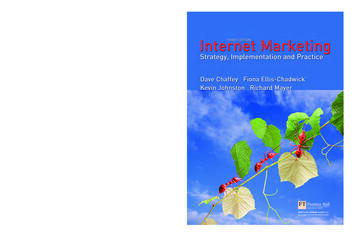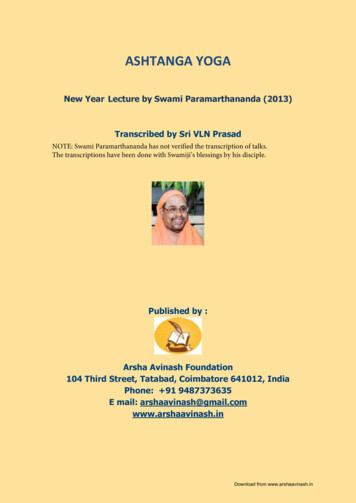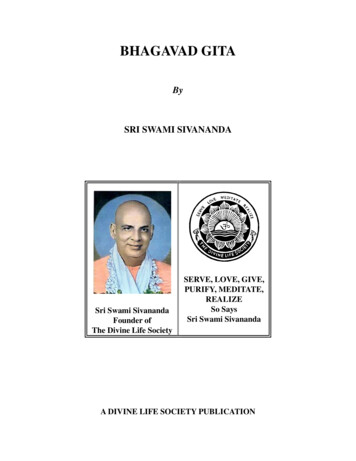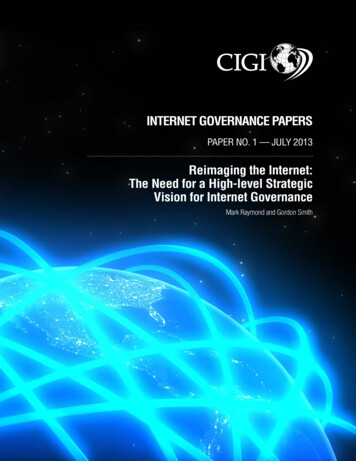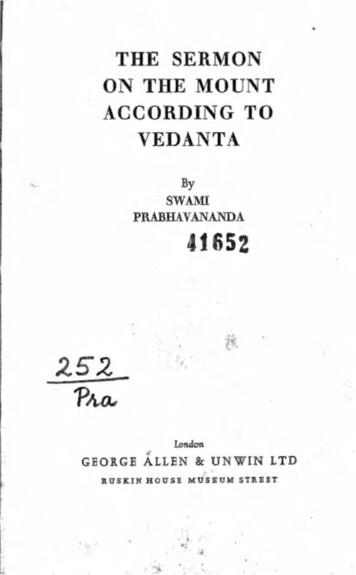
Transcription
THE SERMONON THE MOUNTACCORDING INLondonALLENHOUSE& UNWINMUSEUMLTDSTREET
wet)eeeTHE SERMON ON THE MOUNTACCORDING TO VEDANTA
by Swami Prabhavanandaand Christopher IsherwoodHOW TO KNOW GOD(The Yoga Aphorisms of Patanjali)by Swami Prabhavanandawith the assistance of Frederick ManchesterTHESPIRITUALHERITAGEOF INDIAebnieae
FIRST PUBLISHEDIN 1964This book is copyright under the Berne Convention. Apart from any fair dealing for thepurposes of private study, research, criticismor review, as permitted under the CopyrightAct, 1956, no portion may be reproduced byanyprocessInquirieswithoutshouldwrittenbe addressedpublisher, Swami Prabhavanandapermission.tothe1964UMWNTRAL ARCHAEOLOGICALLIBRARY, NEW DELMI.Maes NO MUG Bitch isdinsessesectonsDate . 22 :X:.8.b.c.ccccsesscosegyPall No 2 as elisePRINTEDINGREATBRITAINin 10 on 11 point Juliang typeBYEASTMIDLANDBURYPRINTINGST. EDMUNDSCO.LTD
oulFOREWORDLetoS)TUJef. .A BOOK on the Sermon on the Mount, which is the very heartof the Christian teaching, should be no novelty in a Christiancommunity. But when that book is written by a Hindu swami,a follower of Vedanta and the gospel of Sri Ramakrishna, abook, moreover, not only interpreting, but extolling theSermon as though it were a scripture of his own, that certainlyis, to say the least, unusual.Beautiful as this interpretation is in itself, it is presented bySwami Prabhavananda not as a far-off, scarcely attainable ideal,gLtyrefheLe\urCt}Sewhich is the way most occidentals read the Sermon, but as apractical programme of daily living and conduct. So clear isthe Swami’s reading of this great scripture, that many aChristian by means of it will discover a simpler approach tothe teaching of his Master, more direct than any he had foundheretofore.Vedanta teaches that man’s real nature is divine and thatacthe chief, the only real goal of human life is to unfold andmanifest that Divinity. To us the Sermon is a counsel of peroe fection. To the Vedantist, whose sole aim is God-realization,that is nothing strange. The sannyasin of the RamakrishnaOrder, to which Swami Prabhavananda belongs, follows theway of perfection every day of his life. Every day in his meditation he prays that he may overcome the sense of ego, that hemay abstain from fault-finding and criticism of others, and thathe may acquire love and sympathy for all. The Vedantistcannot sit down to meditate until he clears his mind of allhatreds and resentments. The literature of the RamakrishnaOrder, as for instance the Gospel of Sri Ramakrishna, thewritings of Swami Vivekananda, and that priceless little book .by Swami Prabhavananda, The Eternal Companion, all arefilled with teachings similar to those of the Sermon and otherparts of our Bible.foesdectneehav
8THE SERMON ON THE MOUNT ACCORDING TO VEDANTAIn the book of Exodus we read that when Moses came downfrom the mount, ‘Moses wist not that the skin of his faceshone’. Swami Prabhavananda in this volume tells of seeingone of his elders, a direct disciple of Sri Ramakrishna, so transfigured. A light emanated from his whole body. Not only didSwami Prabhavananda see it, but crowds of people in a templelane where it occurred, fell back in amazement and made wayas the illumined holy man walked in complete absorption inthe thought of God.Phenomena of that order are not confined to scripturesdating hundreds and thousands of years back. They can and dooccur today. Religion is a continuing fact in human life. Theprescriptions of the Sermon on the Mount can be and are livedtoday. It depends upon the spirit in which they are accepted.Swami Prabhavananda and his fellow-Vedantists accept themrealistically. That is probably the reason that people of variouscreeds and Christian sects, who come to the lectures onVedanta, often find that their own creed appears suddenlybrighter and more luminous, and their understanding of itattains a deeper penetration.Vedanta, briefly, comes to the West not to supplant any religion, but to bring a more tangible spirituality to those whoseek it. Its goal is not to proselytize, but to help man realizethe divinity within him. In that it claims, not without reason,to be the most practical of religious philosophies. And thatpracticality isi what Swami Prabhavananda successfully conyeysin his remarkably fine and lucid interpretation of the Sermonon the Mount.HENRY JAMES FORMAN
ACKNOWLEDGMENTSACKNOWLEDGMENTS are due to a number of publishersfor permission to reprint selections from their books: toAdvaita Ashrama, Mayavati, India, for passages fromThe Complete Works of Swami Vivekananda; to Methuen& Company, Ltd., London, for a passage from The Confessions of Jacob Boehme, compiled and edited by W.Scott Palmer; to the Society for Promoting ChristianKnowledge, London, for passages from The Way of aPilgrim and The Pilgrim Continues His Way, translatedfrom the Russian by R. M. French; and to the VedantaSociety of Southern California for passages from the following works: How to Know God, the Yoga Aphorismsof Patanjali, translated with a new commentary bySwami Prabhavananda and Christopher Isherwood; TheSong of God: Bhagavad-Gita, translated by Prabhavanandaand Isherwood; The Upanishads, translated by Prabhavananda and Frederick Manchester; The Wisdom ofGod (Srimad Bhagavatam), translated by Prabhavananda.Selections from Sri Ramakrishna’s life and teachingsare principally from Sri Sri Ramakrishna Lilaprasanga,by Swami Saradananda, and Sri Sri Ramakrishna Kath-amrita, by M.The lectures upon which this book is based were givenby the author at the Hollywood and Santa Barbaratemples of the Vedanta Society of Southern California.Some portions of the material have appeared in the magazine Vedanta and the West and in an anthology,Vedanta for the Western World, edited by ChristopherIsherwood.I would like to thank Henry James Forman for writingthe preface. I am indebted to Pravrajika Anandaprana
10THE SERMON ON THE MOUNT ACCORDING TO VEDANTAfor editing the manuscript and giving the book its presentform, and to Benjamin Saltman for editorial assistance.S.P.
CONTENTSForeword by Henry James FormanIntroductionpage13CHAPTERI. The BeatitudesII. The Salt of the Earth1733III. Resist Not Evil53IV. Be Ye Therefore Perfect61V. The Lord's Prayer74VI. God and Mammon87VII. Strait is the Gate98
The text of the Authorised (King James) Version ofthe Bible is Crown copyright, and the extracts usedherein are reproduced by permission.
INTRODUCTIONTHIS book is based on lectures I have given on the Sermon onthe Mount. The lectures have been revised and expanded tocover teachings not previously commented upon. To me, theSermon on the Mount represents the essence of Christ’s gospel;and it is printed here in its entirety, as it is set down, so thatChrist’s words may be read in sequence and the unity of hismessage may be clearly seen.I am not a Christian, I am not a theologian, I have not readthe Bible interpretations of the great Christian scholars. I havestudied the New Testament as I have studied the scriptures ofmy own religion, Vedanta. Vedanta, which evolved from theVedas, the most ancient of Hindu scriptures, teaches that allreligions are true inasmuch as they lead to one and the samegoal—God-realization. My religion therefore accepts andreveres all the great prophets, spiritual teachers, and aspects ofthe Godhead worshipped in different faiths, considering themto be manifestations of one underlying truth.As a young monk, I dwelt in close association with most ofthe monastic disciples of Sri Ramakrishna, the founder of theorder to which I belong. These holy men lived in the consciousness of God and taught us the methods by which one mayreach the ultimate and blessed state of mystic union—samadhi,as it is called in Vedanta. From what I have seen in theseholy men, and from whatever understanding I have gainedsitting at their feet, I have tried to approach the teachings ofChrist. This is why I have often turned to the words of SriRamakrishna and his disciples to help explain the truths of theSermon on the Mount.One of these disciples of Sri Ramakrishna was my master,Swami Brahmananda. Although he was not a student of theBible, from, his own spiritual experience he taught in muchthe same way as Christ did, and often used almost the same
14THE SERMON ON THE MOUNT ACCORDING TO VEDANTAwords. My master had seen Christ in spiritual vision, andcelebrated Christmas every year by offering special worship toJesus, a custom which has been observed in all the monasteriesof the Ramakrishna Order to the present day. On theseoccasions fruit, bread, and cake are offered in our Hindu way.Often there is a lecture on Christ; or the story of the Nativityor the Sermon on the Mount is read.One of these Christmas celebrations, the first I ever attended,had great bearing on what Christ means to me. It took placein 1914 at Belur Math near Calcutta, where the headquartersof our order are situated. I had joined the monastery just afew days before. On Christmas Eve, we gathered before analtar on which a picture of the Madonna and Child had beenplaced. One of the senior monks performed worship with offerings of flowers, incense, and food. Many of Sri Ramakrishna’sdisciples attended the service, among them my master, whowas the president of our order. While we were seated insilence, my master said: ‘Meditate on Christ within, and feelhis living presence.’ An intense spiritual atmosphere pervadedthe worship hall. Our minds were lifted up, and we felt ourselves transported into another consciousness. For the first timeI realized that Christ was as much our own as Krishna,Buddha, and other great illumined teachers whom we revered.As a Hindu, I was taught from childhood to respect all re-ligious ideals, to recognize the same divine inspiration in allthe different faiths. Thus Christ as a manifest expression ofdivinity I could never have considered foreign. But for a livingand personal experience of him I needed the tangible heightening of consciousness resulting from the worship on that memorable Christmas Eve.An intimate spiritual connection between Christ and mymonastic order has existed for many years, beginning with itsfounder, Sri Ramakrishna, who was accorded divine worship
INTRODUCTION15during his lifetime and since his passing away in 1886 has re-ceived growing recognition in India as an incarnation of God.Of the many saints and illumined teachers in the historyof Vedanta, Sri Ramakrishna expressed in his life to a greaterdegree than any other teacher the idea of religiousuniversalityand harmony. Not only did he undergo the disciplines ofdivergent sects within Hinduism but those of Mohammedanismand Christianity as well. Through each religious path heachieved the supreme realization of God, and thus was able toproclaim with the authority of direct experience: ‘So manyreligions, so many paths to reach one and the same goal.’It was about 1874 that Sri Ramakrishna interested himselfactively in Christianity. A devotee who used to visit theMaster at the Dakshineswar temple garden near Calcuttawould explain the Bible to him in Bengali. One day, while SriRamakrishna was seated in the drawing-room of another devotee’s home, he saw a picture of the Madonna and Child.Absorbed in contemplation of this picture, he saw it suddenlybecome living and effulgent. An ecstatic love for Christ filledSri Ramakrishna’s heart, and a vision came to him of aChristian church in which devotees were burning incense andlighting candles before Jesus. For three days Sri Ramakrishnalived under the spell of this experience. On the fourth day,while he was walking in a grove at Dakshineswar, he saw aperson of serene countenance approaching with his gaze fixedon him. From the inmost recesses of Sri Ramakrishna’s heartcame the realization, ‘This is Jesus, who poured out his heart’sblood for the redemption of mankind. This is none other thanChrist, the embodiment of love.’ The Son of Man then embraced Sri Ramakrishna and entered into him, and Sri Ramakrishna went into samadhi, the state of transcendental consciousness. Thus was Sri Ramakrishna convinced of Christ'sdivinity.
16THE SERMON ON THE MOUNT ACCORDING TO VEDANTAShortly after Sri Ramakrishna’s death, nine of his youngdisciples gathered on a winter night before a sacred fire to taketheir vows of formal renunciation—henceforth they were toserve God as monks. Their leader, the future Swami Vivekananda, told his brothers the story of Jesus’ life, asking themto become Christs themselves, to pledge themselves to aid inthe redemption of the world, and to deny themselves asJesushad done. Later, the monks discovered that this evening hadbeen the Christian Christmas Eve—a very propitious occasionfor their vows.Thus, since the early days of our order, Christ has beenhonoured and revered by our swamis as one of the greatest ofillumined teachers. Many of our monks quote Christ's wordsto explain and illustrate spiritual truths, perceiving an essential unity between his message and the message of our Hinduseers and sages. Like Krishna and Buddha, Christ did notpreach a mere ethical or social gospel but an uncompromisinglyspiritual one. He declared that God can be seen, that divineperfection can be achieved. In order that men might attainthis supreme goal of existence, he taught the renunciation ofworldliness, the contemplation of God, and the purification ofthe heart through the love of God. These simple and profoundtruths, stated repeatedly in the Sermon on the Mount, con-stitute its underlying theme, asI shall try to show in thepagesto follow.July, 1963.SWAMIPRABHAVANANDA
CHAPTERIThe BeatitudesMATTHEW 5:1-12BEFORE the time came for Jesus to give his Sermon on theMount, he travelled all over Galilee preaching. ‘And his famewent throughout all Syria,’ as St Matthew said. The newsspread of an extraordinary teacher, and crowds gathered tosee him—as they have done for thousands of years in theOrient and still do at the approach of a God-man. Theyjourneyed ‘from Galilee, and from Decapolis, and from Jerusalem, and from Judaea, and from beyond Jordan’. And Jesustaught the multitudes according to their capacity; but hisSermon, which contains his highest teachings, he reserved forhis disciples, for the ones who were spiritually ready. He tookthem to a hillside where they would not be interrupted bythose who wanted less than his supreme truth.:And seeing the multitudes, he went up into amountain:and when he was set, his disciples came unto him:And he opened his mouth, and taught them, saying, - - -Every spiritual teacher, whether he is a divine incarnationor an illumined soul, has two sets of teachings—one for theelephant has twomultitude, the other for his disciples. Thesets of teeth: the tusks with which he defends himself fromexternal difficulties and the teeth with which he eats. Thespiritual teacher prepares the way for his message with broadlessons—with his tusks, as it were. The innér truth of religionhe reveals only to his intimate disciples. For religion issomething which can actually be transmitted. A truly illuminedB
18THE SERMON ON THE MOUNT ACCORDING TO VEDANTAteacher can transmit to us the power which unfolds the divineconsciousness latent within us. But the field must be fertileand the soil ready before the seed can be sown.When crowds came on Sundays to visit Sri Ramakrishna,the most widely revered mystic of modern India, he wouldspeak to them in a general way which benefited them. Butwhen his intimate disciples gathered around him, asI was toldby one of them, he would make sure that he was not overheard while giving them the sacred truths of religion. Not thatthe truths themselves are secret—they are recorded, and anyone can read them. But what he gave to these disciples wasmore than verbal teachings. In a divine mood he would uplifttheir consciousness.Christ taught in the same way. He did not give the Sermonon the Mount to the multitudes, but to his disciples, whosehearts were prepared to receive it The multitudes are not yetable to understand the truth of God. They do not really wantit. My master, Swami Brahmananda, used to say: ‘How manyare ready? Yes, many people come to us. We have the treasureto givé them. But they only want potatoes, onions, and eggplants !’Any one of us who sincerely wants the treasure, who seeksthe truth, can benefit from the message given in the Sermonon the Mount and can become a disciple. Christ, as we shallsee in our study of his Sermon,— of the conditions ofdiscipleship which we must fulfil—for which we must prepareourselves. He teaches the ways and means to attain to thepurification of our hearts, so that the truth of God may befully revealed within us.Blessed are the poor in spirit: for their's is the kingdom ofheaven.In this first beatitude, Christ speaks of the chief character-istic which the disciple must have before he is ready to acceptwhat the illumined teacher has to offer him. He must be poorin spirit; in other words, he must be humble. If a man has
THE BEATITUDES19pride in learning, wealth, beauty, or lineage, or has preconceived ideas of what spiritual life is and how he should betaught, his mind is not receptive to higher teachings. In theBhagavad-Gita, the gospel of the Hindus, we read:‘Those illumined souls who have realized the Truth will instruct you in the knowledge of Brahman [the transcendentaspect of God] if you will prostrate yourself before them,question them, and serve them as a disciple.’According to an Indian tale, a man came to a teacher andasked to be made a disciple. The teacher, with his spiritual in-sight, realized that the man was not ready to be taught. So heinquired: ‘Do you know what you have to do in order to be adisciple?’ The man said he did not, and asked the teacher totell him. ‘Well,’ said the teacher, ‘you have to fetch water,gather fuel, cook, and do many hours of heavy work. You alsohave to study. Are you willing to do all that?’The man said: ‘Now I know what the disciple has to do.Tell me please, what does the teacher do?’:‘Oh, the teacher sits and gives spiritual instructions in hisquiet way.’‘Ah, I see!’ said the man. ‘In that case, I don’t want to be adisciple. Why don’t you make me a teacher?’We all want to be teachers. But before we become teacherswe must learn to be disciples. We must learn to be humble.Blessed are they that mourn: for they shall be comforted.As long as we think that we are rich in worldly goods or inknowledge, we cannot make spiritual progress. When we feelthat we are poor in spirit, when we grieve that we have notrealized the truth of God, then only will we be comforted. Nodoubt we all mourn—but for what? For the loss of worldlypleasures and possessions. But that is not the kind of mourningof which Christ speaks. The mourning which Christ calls‘blessed’isvery rare, because itarises from a sense ofspiritual
20THE SERMON ON THE MOUNT ACCORDING TO VEDANTAloss, spiritual loneliness. It is a mourning which necessarilycomes before God comforts us. Most of us are quite satisfiedwith the surface life we are leading. In the back of our mindsperhaps we are aware that we lack something, but still wecling to the hope that this lack can be filled by the senseobjects of this world.Sri Ramakrishna used to say: ‘People weep rivers of tearsbecause a son is not born or because they cannot get riches.But who sheds even one teardrop because he has not seenGod?’ This false sense of values is the result of our ignorance.Regarding the nature of this ignorance, the Indian philosopherShankara said that the subject, the knower (Self or Spirit), isas opposed to the object, the known (non-Self or matter), aslight is opposed to darkness. Yet through the influence ofmaya, the inexplicable power of ignorance, the subject andobject have become mixed, so that man habitually identifiesthe Self with the non-Self. It is very easy to understand intellectually that the true Self is different from the body, just aswe are different from the clothes we wear. Yet when the bodyis diseased, we say: ‘I am sick.’ Intellectually we can understand that the true Self is different from the mind. Yet whena wave of happiness or suffering arises, we say: ‘I am happy,’or ‘I am miserable.’ Also, we identify ourselves with ourrelatives and friends: anything happening to them seems tobe happening to us. We identify ourselves with our possessions.If we lose our wealth, we feel as if we had lost ourselves. Thisignorance is common to all mankind. It can only be removedby the direct knowledge of God. When we begin to feel aspiritual lack within ourselves, when we begin to mourn asChrist wished us to mourn, when we shed even one tear forGod, then we prepare the way for the comfort of that divineknowledge. ,The kind of mourning that Christ called blessed is expressedin the Imitation of Christ:‘O Lord God, when shall I be made one with thee and bemolten into thy love, so that I wholly forget myself? Be thou
THE BEATITUDES21in me, andI in thee; and grant that we may so abide, alwaystogether in one.’We must come to this stage, when we feel that nothing cangive us peace except the vision of God. Then God draws man’smind to himself as a magnet draws a needle, and comfortcomes.Blessed are the meek: for they shall inherit the earth.Ignorance and delusion are characteristic of the unregeneratemind. This ignorance is confirmed and buttressed by our senseof ego—our idea that we are separate from one another andfrom God. Egotism must be overcome if the mind is to be freedfrom delusion. Therefore—blessed are the meek. But why doesChrist say that they shall inherit the earth? At first sight, thisseems difficult to understand. Among the yoga aphorisms’ ofPatanjali (yoga means union with God, also the path to thatunion) there is one aphorism which corresponds to this beatitude: ‘The man who is confirmed in non-stealing becomes themaster of all riches.’ What is meant by ‘non-stealing’? It meansthat we must give up the egotistic delusion that we can possessthings, that anything can belong exclusively to us as individuals. We may think: ‘But we are good people. We do notsteal anything! Whatever we have, we have worked for andearned. It belongs to us by right.’ But the truth is that nothingat all belongs to us. Everything belongs to God. When we regard anything in this universe as ours, we are appropriatingGod's possession.What then is meekness? It is to live in self-surrender toGod, free from the sense of ‘me’ and ‘mine’. This does not meanthat we should get rid of wealth, family, and friends; but weshould get rid of the idea that they belong to us. They belongto God. We should think of ourselves as God's servants towhose care he has entrusted his creatures and possessions. Assoon as we understand this truth and give up our deluded in-
22.THE SERMON ON THE MOUNT ACCORDING TO VEDANTAdividual claims, we find that in the truest sense everythingbelongs to us after all.Conquerors who try to become masters of the world by forceof arms never inherit anything except worry, trouble, andheadaches. Misers who accumulate huge wealth are onlychained to their gold, they never really possess it, But the manwho has given up his sense of attachment experiences theadvantages which possessions afford without the misery whichpossessiveness brings.Many people dislike this saying of Christ’s because theythink that the meek can never achieve anything. They thinkthat no happiness is to be had in life unless one is aggressive. When they are told to give up the ego, to be meek, theyare afraid that they will lose everything. But they are wrong.In the words of Swami Brahmananda:‘People who live in the senses think that they are enjoying life.What do they know about enjoyment? Only those who arefilled with divine bliss really enjoy life.’But arguments will not prove this truth. You have to experience it; then only will you be convinced.If a spiritual —sincerely follows Christ’s teaching ofmeekness, he will find it very practical. He will find that angerand resentment can be conquered by gentleness and love. TheChinese mystic Lao Tzu expressed this truth by saying:‘Of the soft and weak things in the world, none is weaker thanwater. But in overcomingthat which is firm and strong,nothing can equal it. That which is soft conquers the hard.Rigidity and hardness are companions of death. Softness andtenderness are companions of life.’By sincerely giving up the ego to God, by being meek, we willgain everything. We will inherit the earth.
THE BEATITUDES23Blessed are they which do hunger and thirst after righteousness: for they shall be filled.What is the righteousness for which Christ wants us tohunger and thirst? It is the righteousness which in a numberof passages in the Old Testament is practically synonymouswith salvation—in other words, with deliverance from evil,and union with God. This righteousness therefore is not whatwe ordinarily think of as moral virtues or good qualities, notrelative good as opposed to evil or relative virtue as opposed tovice, but absolute righteousness, absolute goodness. The hungerand thirst after the righteousness of which Christ speaks is ahunger and thirst after God himself.It has already been pointed out that most of us do not reallywant God. If we analyse ourselves, we shall find that our interest in God is not nearly as strong as our interest in all kindsof worldly objects. But even a slight desire to know the divinereality is a beginning that can lead us higher. We must startwith self-effort. We must struggle to develop love for the Lordby practising recollectedness of him, by prayer, worship, andmeditation. As we practise these spiritual disciplines, our slightdesire to realize him will become intensified until it is a raginghunger and a burning thirst.To those who asked him how to realize God, Sri Ramakrishna would say:‘Cry tohim with a yearningheart, and then you will see him.After the rosy light of dawn out comes the sun; likewise, long-ing is followed by the vision of God. He will reveal himself toyou if you love him with the combined force of these threeattachments: the attachment of a miser to his wealth, that ofa mother to her new-born child, and that of a chaste wife toher husband. Intense longing is the surest way to God-vision.’‘We must learn to direct all our thoughts and all our energyconsciously towards God. One gigantic thought-wave must beraised in the mind, engulfing all the cravings and passions
24THE SERMON ON THE MOUNT ACCORDING TO VEDANTAwhich distract us from the spiritual goal. When the mind thusbecomes one-pointed and concentrated upon God, we shall befilled with righteousness.There is a story of a disciple who asked his teacher, ‘Sir, howcan I realize God?’‘Come along,’ said the teacher, ‘I will show you.’He took the disciple to a lake, and both plunged in. Suddenlythe teacher reached over and pressed the disciple’s head underwater. A few moments later he released him and asked: ‘Well,how did you feel?’‘Oh, I was dying for a breath of air!’ gasped the disciple.Then the teacher said: ‘When you feel that intensely forGod, you won’t have to wait long for his vision.’Blessed are the merciful: for they shall obtain mercy.One of the yoga aphorisms of Patanjali, the father of Hindupsychology, corresponds to this beatitude:‘Undisturbed calmness of the mind is attained by cultivatingfriendliness towards the happy, mercy and compassion for theunlerpy delight in the virtuous, and indifference towards thewicked.’To be merciful is one of the conditions necessary before we canreceive the truth of God. Envy, jealousy, hatred—these aresome of the universal weaknesses inborn in man. They arelinked with our ego-sense which stems from ignorance. Howare we to overcome them? By raising an opposite wave ofthought. When somebody is happy, we should not be jealousof him; we should try to realize our friendship and andbe happy with him. When somebody is unhappy, weshouldnot be glad; we should feel sympathy and be merciful. Whena man is good, do not be envious. When he is bad, do not hatehim. Be indifferent to the wicked. Any thought of hate, evenso-called ‘righteous hatred’ of evil, will raise a wave of hatredand evil in our own minds, increasing our ignorance and rest-
THE BEATITUDES25lessness. We cannot think of the Lord or love him until thisthought-wave has subsided. If we want to find God, we have tobecome God-like in mercy.My master used to say: ‘What is the difference betweenman and God? Man, if you hurt him but once, will forget allyour previous kindnesses to him and remember the one timeyou failed. But if you forget God and sin against him hundredsof times, still he will forgive all your faults and remember thefew times that you sincerely prayed to him. Sin exists only inman's eyes; God does not look to man’s sins.’Blessed are the pure in heart: for they shall see God.In every religion we find two basic principles: the ideal tobe realized and the method of realization. Every scripture ofthe world has proclaimed the truth that God exists and thatthe purpose of man’s life is to know him. Every great spiritualteacher has taught that man must realizeand be rebornin spirit. In the Sermon on the Mount the attainment of thisideal is expressed as perfection in God: ‘Be ye therefore perfect,even as your Father which is in heaven is perfect.’ And themethod of realization which Christ teaches is the purificationof the heart which leads to that perfection.What is this purity which we must have before God revealshimself to us? We all know of people whom we would describeas pure in an ethical sense, but they have not seen God. Whatis the reason? Ethical life, the steady practice of moral virtues,is needed as a preparation for spiritual life and therefore is afundamental teaching in every religion. But it does not enableus to see God. It is like the foundation of a house; it is not thesuperstructur
hatreds and resentments. The literature of the Ramakrishna Order, as for instance the Gospel of Sri Ramakrishna, the writings of Swami Vivekananda, and that priceless little book . by Swami Prabhavananda, The Eternal Companion, all are filled with teachings sim

